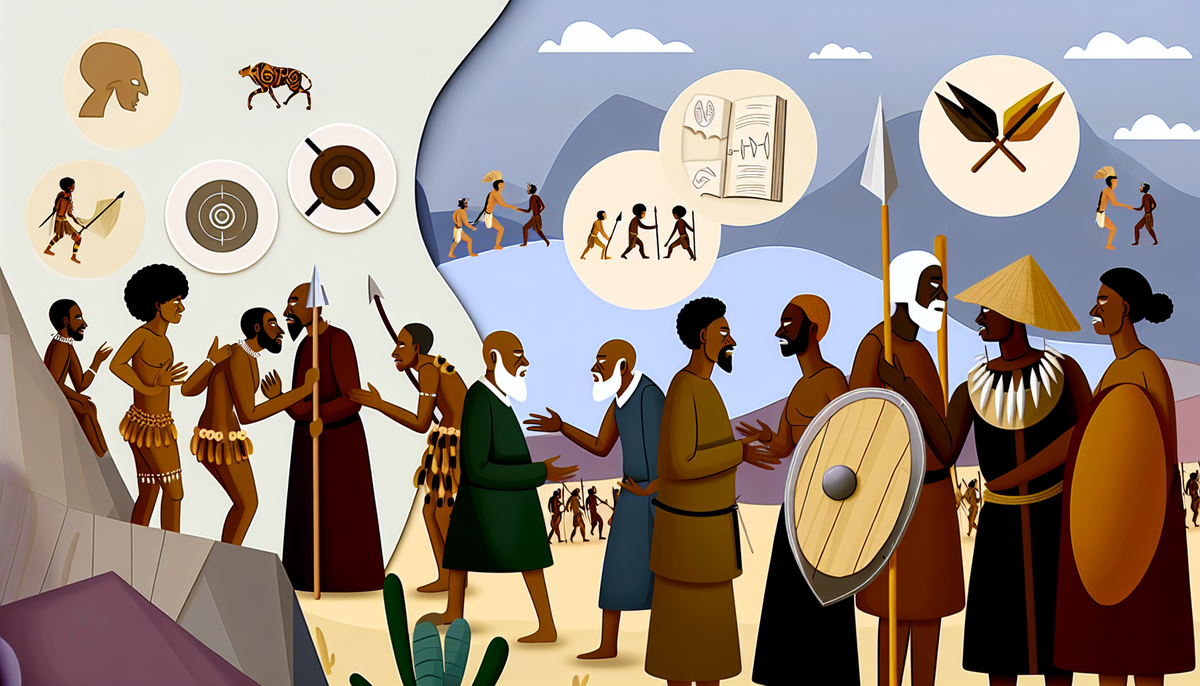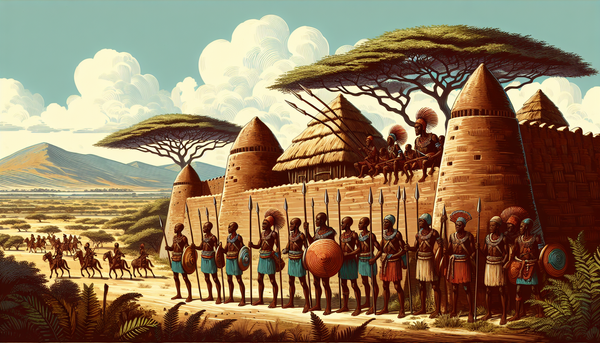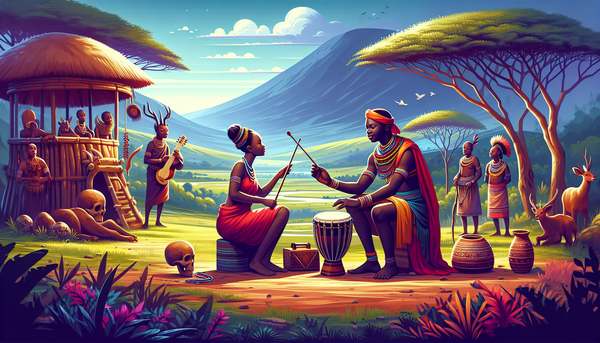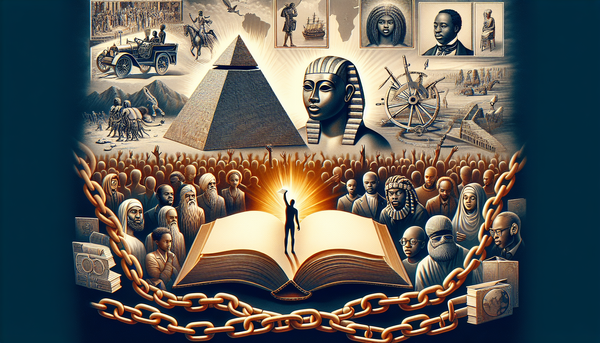Inter-tribal Relations and Conflicts in Pre-Colonial Africa

Understanding the Cultural Landscape of Pre-Colonial Africa
Pre-colonial Africa was a mosaic of diverse cultures, languages, and traditions, each contributing to the continent's rich tapestry. With over 3,000 distinct ethnic groups, the cultural landscape was characterized by various lifestyles, from nomadic tribes to settled agricultural communities. These groups had their unique beliefs, customs, and social structures, which influenced their interactions with one another.
The oral tradition played a significant role in preserving histories and cultural narratives. Storytelling, music, and dance were essential forms of expression, fostering a sense of identity and community among tribes. For instance, the Griots of West Africa served as historians, musicians, and storytellers, maintaining the legacies of families and tribes through their performances.
Trade routes, both overland and maritime, facilitated not only the exchange of goods but also cultural ideas, languages, and practices. This interconnectedness allowed for a blending of cultures, resulting in shared customs across tribes. However, it also led to rivalries, as resources became points of contention. Understanding this cultural complexity is essential to grasp the nuanced inter-tribal relations and conflicts that shaped pre-colonial Africa, setting the stage for the historical developments that would follow.
Economic Foundations of Tribal Interactions
The economic foundations of tribal interactions in pre-colonial Africa were pivotal in shaping relationships among diverse ethnic groups. Subsistence agriculture, livestock herding, and fishing were the primary means of sustaining communities. Different tribes often specialized in particular economic activities based on their geographic locations and environmental resources, leading to interdependence between groups.
Trade networks flourished as tribes exchanged surplus goods. For example, agricultural communities traded crops like millet and sorghum with pastoralist tribes that offered livestock products such as milk and meat. This exchange not only provided essential resources but also fostered social bonds and cultural relationships, allowing for the sharing of ideas and traditions.
Craftsmanship also played a significant role in economic interactions. Artisans produced textiles, pottery, and tools, which became valuable commodities in trade. Markets emerged as hubs of economic activity, attracting diverse groups and facilitating the flow of goods and knowledge.
However, competition for resources could lead to conflicts. Scarcity, driven by droughts or territorial disputes, often ignited tensions between tribes. Thus, the economic foundations of tribal interactions were a double-edged sword, promoting cooperation and trade while simultaneously laying the groundwork for rivalry and confrontation in pre-colonial Africa.
Diplomatic Engagements Between African Tribes
Diplomatic engagements among African tribes in pre-colonial times played a crucial role in fostering peace, trade, and alliances. Despite cultural and linguistic diversity, many tribes recognized the importance of diplomacy in maintaining stability and mutual interests. Negotiation was often conducted through elders or respected leaders, who served as intermediaries during discussions.
Tribes engaged in formal treaties to establish boundaries, resolve disputes, and arrange trade agreements. These treaties were sometimes reinforced with symbolic acts, such as shared rituals or the exchange of gifts, which strengthened relationships and signified mutual respect. Cultural practices such as marriage alliances were frequently used, as they created familial connections that further solidified diplomatic ties.
Additionally, tribal councils and gatherings allowed leaders to discuss issues affecting multiple groups. These assemblies provided a platform for dialogue, enabling tribes to address grievances and collaboratively develop solutions. Oral histories often preserved these diplomatic efforts, ensuring that subsequent generations understood the significance of peaceful negotiation.
However, the delicate balance of diplomacy meant that rivalries and conflicts could easily arise. Successful negotiation required skill, tact, and an understanding of the underlying cultural dynamics. Thus, the diplomatic engagements of pre-colonial African tribes were essential in navigating complex social landscapes and ensuring communal harmony.
Warfare and Defense Strategies Among Tribes
Warfare and defense strategies among tribes in pre-colonial Africa were shaped by environmental conditions, resources, and social structures. Tribes often engaged in conflicts due to competition over land, livestock, and trade routes or to exert influence over neighboring groups. As a result, effective military organization and strategy became critical for survival.
Most tribes were organized into clans or units, each specializing in certain combat roles. Warriors were trained from a young age, honing skills in weaponry, tactics, and survival. Weapons varied widely, ranging from spears and bows to shields made from animal hides and wood. Some tribes also employed psychological warfare, using intimidation tactics such as war dances or fierce displays of warrior prowess to unsettle their opponents.
Defensive strategies included the construction of fortified settlements, which protected communities from raids. These structures were often strategically located to take advantage of natural defenses like cliffs or rivers. Additionally, tribes formed alliances to bolster their military strength against common enemies, creating coalitions that could be more effective in warfare.
Warfare, while often destructive, also played a role in social cohesion and identity, as victorious tribes would celebrate their achievements, reinforcing their cultural narratives and communal bonds. Thus, the dynamics of warfare shaped not only the physical landscape but also the social fabric of pre-colonial Africa.
Influence of Geography on Tribal Dynamics
Geography significantly influenced tribal dynamics in pre-colonial Africa, shaping patterns of settlement, resource availability, and inter-group interactions. The continent's diverse landscapes—including vast savannahs, dense rainforests, arid deserts, and fertile river valleys—dictated the lifestyles and economic activities of various tribes.
For instance, tribes in the Nile Valley benefited from the river's annual flooding, which provided fertile soil for agriculture, leading to the development of settled communities. In contrast, nomadic tribes in the Sahel adapted to arid conditions by herding cattle and moving seasonally in search of grazing land and water. This geographical diversity necessitated different survival strategies and social structures.
Natural barriers, such as mountains and rivers, also influenced tribal interactions. While some geographical features facilitated trade and communication, others acted as obstacles, leading to isolated tribal communities. This isolation sometimes resulted in distinct cultural identities and languages, while also limiting inter-tribal conflict.
Moreover, territorial disputes over fertile land or water sources often resulted in tensions and warfare. Thus, geography not only dictated the livelihood of tribes but also played a crucial role in shaping their relationships, alliances, and conflicts, underscoring the complex interplay between environment and human behavior in pre-colonial Africa.
Spiritual Beliefs and Their Role in Conflict
In pre-colonial Africa, spiritual beliefs were deeply intertwined with everyday life and played a significant role in shaping social norms, community cohesion, and conflicts among tribes. Most African societies practiced animism, venerating ancestors and spirits of nature, which influenced their worldviews and interactions with others. The belief in spiritual forces often defined morality and justice, and communities turned to spiritual leaders for guidance in both peace and conflict.
When disputes arose, tribal leaders frequently invoked spiritual beliefs as a means of legitimizing their actions or decisions. Rituals, such as sacrifices or divination, were performed to seek divine favor or to determine the rightful course of action. These ceremonies emphasized the moral implications of warfare and could either escalate tensions or foster reconciliation, depending on the community's interpretation of spiritual guidance.
Moreover, spiritual beliefs sometimes contributed to conflict, particularly when tribes claimed divine endorsement for territorial expansion or resource acquisition. The destruction of sacred sites or disrespect towards ancestral spirits could incite retaliatory actions, amplifying rivalries.
Thus, spiritual beliefs acted as a dual force in pre-colonial Africa—serving as a source of unity and social cohesion while simultaneously fueling tensions and conflicts among tribes when interpretations diverged or when sacred values were threatened.
Legacy of Pre-Colonial Conflicts on Modern Africa
The legacy of pre-colonial conflicts continues to shape modern Africa, influencing political boundaries, social structures, and inter-tribal relationships across the continent. Historical rivalries and alliances established during this period have left indelible marks on contemporary societal dynamics. Many modern disputes can trace their roots to the tribal conflicts of the pre-colonial era, where issues related to land ownership, resource distribution, and ethnic identities persist.
Colonial powers often exacerbated these divisions by imposing arbitrary borders that disregarded existing tribal territories and relationships. This has led to tensions and conflicts in many countries, as various ethnic groups contest political power and access to resources. Ethnic identity often plays a crucial role in politics, sometimes leading to violence and instability in regions where groups feel marginalized.
Moreover, the communal values and practices rooted in pre-colonial cultures still influence social cohesion and community governance today. In some areas, traditional conflict resolution methods are employed alongside formal judicial systems, highlighting the enduring relevance of these historical practices.
Thus, the legacy of pre-colonial conflicts is a complex tapestry that continues to influence modern African societies, underscoring the importance of understanding historical contexts in addressing contemporary challenges.



